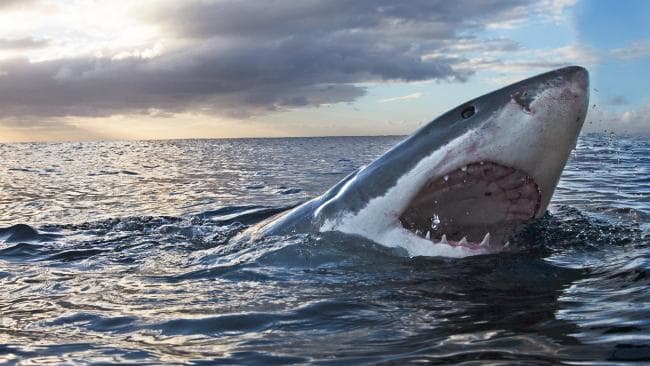There are some ways in which great white sharks are different from Victorian-era poets.
Well, there are probably a lot of ways, but we’ll settle on these:
— Poets, like other mammals, reach full size by early adulthood; sharks, like other fish, don’t. “They never stop growing,” said Chris Lowe, a marine biology professor featured in cable’s “Sharkfest.”
— We already know most of the details about old poets; great whites are another matter. “Biologists thought they were coastal,” Lowe said. “Boy were we wrong about that.”
There are other differences, of course. Victorian poets didn’t eat whale blubber, chomp on rubber boats or consume 400 pounds in a single meal. But those first two show why Lowe is glad he chose this for his doctorate: Sharks proved a steady flow of surprises and discoveries.
That became clear in a special that debuted Sunday (July 21) on both National Geographic channels and reruns often. (See box at the end. The film – eyeing a 20-foot, two-and-a-half ton giant – is called “World’s Biggest Great White?”
The question-mark is important, Lowe said. “I’m convinced there are bigger ones.”
That’s because of the never-stop-growing thing. The lifespan of a great white is believed to be in the 45-to-70-year range, Lowe said, but that’s still being studied. By comparison, some Greenland sharks have been estimated at 470 years.
The documentary starts with young marine photographers going to a whale carcass near Oahu, to film the small sharks’ feeding frenzy. Suddenly, a big one arrives. “She really was very stately in her movement and manner,” Kimberly Jeffries says.
They take elaborate pictures, then compare the traces and scars to others on file … and are startled to find that this is the one who was named Deep Blue, off the coast of Mexico’s Guadalupe Island. “Deep Blue is probably the most famous shark in the wold, besides (the fictional) Jaws,” Mark Mohler says.
A few years ago, Lowe said, that seemed impossible. Guadalupe and Oahu are 2,400 miles apart; great whites were assumed to be coastal. But modern tracking methods have shown they roam afar.
Discoveries keep arriving, making his career choice a good one. Lowe, 55, grew up on Martha’s Vineyard, where his father was a carpenter and grandfather was a fisherman. He’s closer to his grandfather’s world, now teaching and running the shark lab at Cal State, Long Beach.
Cable’s “Shark Week/Sharkfest” obsession has spurred fresh interest. It’s unfortunate that this is “driven by fear,” Lowe said, but at least it’s stirred much-needed knowledge. “In the last 50-some years, people have become predator-stupid.”
Predators aren’t interested in humans, he said, but it’s best to avoid a bear or a shark. If you do confront one in the water, “keep an eye on the shark. Let it know you know it’s there.”
If it moves, keep staring at it. Sharks prefer to strike from behind; Victorian poets, incidentally, preferred not to strike at all.
— “Sharkfest” is in its seventh year; this time, it started on National Geographic and continues on Nat Geo Wild.
— On July 21, one film — “World’s Biggest Great White?” — was on both National Geographic channels. It will rerun often on Wild, including (all times ET) 9 p.m. and midnight July 25, 9 a.m. July 28, 10 p.m. and 1 a.m. Aug. 2 and 9 a.m. Aug. 9; also, National Geographic airs it at 9 a.m. ET Aug. 18.
— “Shark Week” is in its 34th year on Discovery. It starts July 28 and continues through Aug. 4; at 9 p.m. July 31, it has its first scripted movie. Josh Duhamel stars in “Capsized: Blood in the Water,” which is based on a true story.
